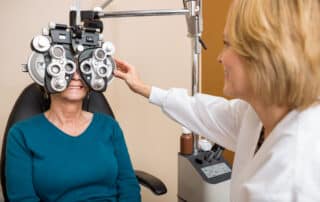Congress is gearing up to pass a budget reconciliation package, and there are several important Medicare provisions affecting seniors, including first-time Medicare coverage for vision, hearing, and dental care.
These Medicare provisions are proposed to phase in vision, hearing, and dental benefits in 2022, 2023, and 2028, respectively. The Congressional Budget Office has estimated that vision benefits would cost $30 billion over 10 years, hearing benefits would cost $89 billion over 10 years, and dental benefits would cost $238 billion over 10 years.
The legislation would also make broader changes to prescription drug coverage under Medicare. In addition to allowing the federal government to negotiate drug prices, the legislation would create new prescription drug rebate programs and cap out-of-pocket prescription drug costs for seniors under the Medicare Part D program.
Vision Benefits
Vision services would be a newly covered benefit beginning on October 1, 2022. Medicare would cover a routine eye exam and certain contact lens fitting services every two years. The government would pay 80 percent of the costs, leaving 20 percent of costs to beneficiaries. Medicare would also pay up to $85 towards one pair of glasses or a two-year supply of contact lenses every two years. Ophthalmologists and optometrists would qualify for Medicare reimbursement.
Hearing Benefits
The Medicare program would cover hearing services—specifically hearing aids and aural rehabilitation and treatment services by qualified audiologists—beginning on October 1, 2023. Hearing aids would be covered as a prosthetic device, with Medicare paying 80 percent of the costs. Beneficiaries diagnosed with profound or severe hearing loss in one or both ears could qualify for non-over-the-counter hearing aids every five years. Audiologists would qualify for Medicare reimbursement.
Dental Benefits
Dental and oral health services would be covered by Medicare beginning on January 1, 2028. This implementation timeline is longer than the other benefits, presumably because the addition of dental services is among the costliest health provisions, and it may be complex for federal officials to implement this new benefit.
Dental and oral health services include new preventive and screening services (oral exams, dental cleanings, dental x-rays, and fluoride treatments) furnished by a dentist or oral health professional. Each year, beneficiaries would receive up to two preventive and screening oral exams and up to two dental cleanings. Coverage would also be available for basic and major dental treatments. Those treatments would be defined by the Secretary of HHS. Basic treatments may include basic tooth restorations, basic periodontal services, tooth extractions, and oral disease management services. Major treatments may include major tooth restorations, major periodontal services, bridges, crowns, and root canals. The legislation would also create coverage rules for dentures.
Medicare would pay for dental and oral health services using the lesser of the actual charges or an existing fee schedule that may include fees under existing programs (such as TRICARE, Medicaid, and Medicare Advantage). Medicare would cover 80 percent of the cost for preventive and screening services and basic services, leaving 20 percent of costs to beneficiaries. Beginning in 2028, Medicare would pay 10 percent for major treatments; this percentage would increase by 10 percentage points each year through 2032 and level off at 50 percent. Oral health professionals would qualify for Medicare reimbursement.
If you are in support of these Medicare provisions, we encourage you to click here and fill out a form to ask your elected officials to add affordable oral health care to Medicare, courtesy of the Center for Medicare Advocacy.


